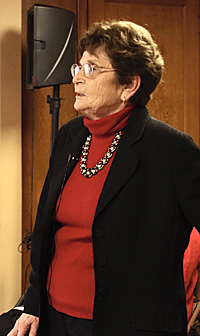By Dani Hemmat, JTNews Correspondent
Marga Steinhardt Griesbach was 5-1/2 when Hitler assumed power in Germany. She would spend the next 12 years in ghettos, concentration camps and even the death marches, helping her injured mother escape the executioner’s revolver in the nick of time.
Talking about her life in Nazi Germany in front of a full house at Congregation Beth Hatikvah in Bremerton on Sun., Jan. 10, 82-year-old Griesbach eschewed the P.A. system to deliver her story in a clear, strong voice.
Standing before the largest crowd of adults she’d ever spoken to, Griesbach told how her early life in the small town of Witzenhausen was normal for her parents, Therese and Max, and her little brother Alfred. Her first memory of the outside world, however, was “of political marches and demonstrations, often leading to bloody fights between the Nazis and Communists.”
When Hitler took power, she became aware of an unusual tension among her parents and Jewish neighbors.
“People were worried, very nervous,” Griesbach said. “People were argumentative. People who would never fight were suddenly fighting with each other.”
The stress compounded quickly after April 1, 1933, with the declaration of a general boycott of Jewish businesses. It became increasingly difficult to earn a living; all the while new decrees, regulations and laws handed down against Jews made life more unbearable. Friends and playmates began to shun the Steinhardts, with Griesbach once being thrown out of a friend’s apartment by the girl’s angry father.
Her education was derailed at age 10 — the age that German schoolchildren would normally advance to high school — when Jewish children were forbidden to attend. Instead, she remained in the Volksschule (elementary school), studying basic subjects and tolerating daily beatings at the hands of other students. Despite everything, her family struggled to continue their lives in Witzenhausen, miserable as it was. They could not believe that things could get much worse. Then came November 8, 1938.
Kristallnacht, the November 9, 1938 pogrom touted as a spontaneous action against the Jews, would happen one day early in their town. While word had gotten to most of the Jewish people in Witzenhausen ahead of time, there was little anyone could do to stop it.
Griesbach’s family barricaded themselves in a bedroom. Although most Jewish homes and businesses in the town suffered greatly that night, they went untouched. When Griesbach went to school the next day, however, she encountered ripped pages of prayer books and unrolled, ripped Torah scrolls in the town square fountain. As she hurried to school, she passed by the synagogue just as a piano was being heaved out a window while people vandalized the building.
Someone spied Griesbach and shout–ed, “Get the damn Jew girl!” she said.
She managed to outrun the angry mob and made it home, but it was enough to make her parents take some action toward self-preservation, even if it was only to secure their valuables with relatives in Frankfurt, away from Witzenhausen.
While Therese Steinhardt traveled to Frankfurt, the Witzenhausen synagogue burned to the ground. Marga’s father, Max, the treasurer, was called to the town hall to discuss fire insurance, leaving Marga, her young brother and elderly grandmother alone in the apartment. He did not come back. They spent several days alone until her mother returned.
Max returned a month later. An old friend who warned him that all Jewish men would be arrested had implored Max to flee. Max had warned all the men on the arrest list as well, but only one other man heeded his warning; the rest were taken to Buchenwald.
The Steinhardts were soon deported to Riga, Latvia, where they found streets filled with frozen blood and deplorable living conditions. While many families took valuables and possessions from the homes of the relocated Latvian Jews, Marga’s family refused.
“We weren’t too smart,” Griesbach said. “We maybe could have traded those goods for food later on, but we could not imagine going through another’s possessions, even if they were never coming back. ”
Griesbach watched those who couldn’t work get sent away, never to return. Luck played a big role in many of her family’s narrow escapes. She used a red lipstick her mother had found to make herself look older and her mother look younger to be transferred to a safer work camp.
Luck wasn’t always with them, however. The Steinhardts were eventually separated, and both Max and Alfred died in the camps.
But the biggest, boldest move was the one that saved her and her mother’s lives. As Germany retreated, they marched prisoners through snow and ice, starving them and executing at gunpoint anyone who fell behind. Therese had suffered frostbite and could barely walk. For reasons she still can’t verbalize, Marga grabbed her mother and ducked behind a shed, hiding as Nazis and prisoners marched by.
They escaped, and after weeks of begging they made their way west — Marga carrying her mother in a handcart — to finally meet up with Allied forces.
For many years Griesbach did not talk or think about her life during Hitler’s reign. But after what she called an emotionally cleansing trip back to Germany, she was ready to recount the horrors of her youth. Her story is no different from those of the other 4.5 million that happened during the Holocaust, she said, but it is her story and it deserved to be told.
Marga’s 52-page account, Growing Up Jewish in Hitler’s Germany, is available to the public through the West Sound Hadassah branch. Contact viviansm@earthlink.net for information.
